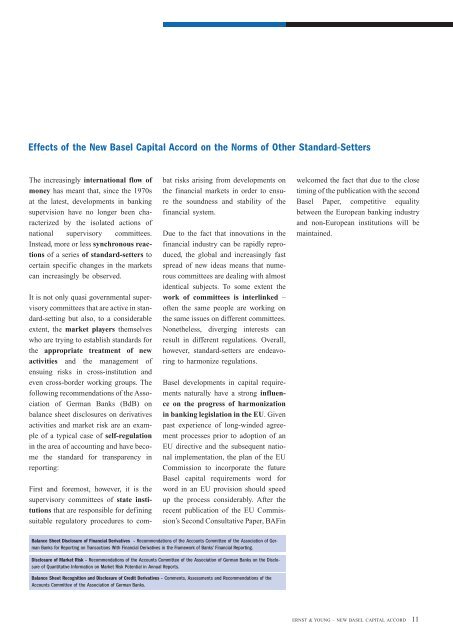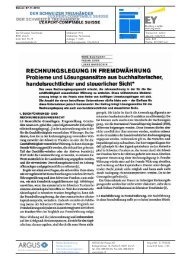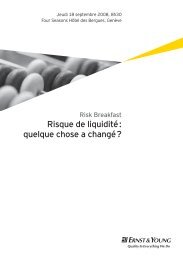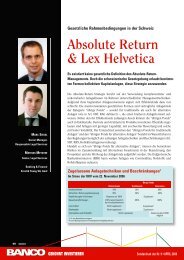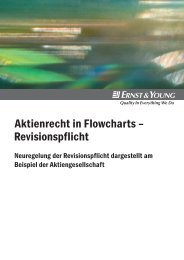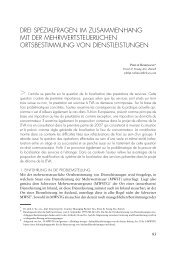Future Scope of Application of The <strong>New</strong> <strong>Basel</strong> <strong>Capital</strong> <strong>Accord</strong><strong>Basel</strong> I Aimed at International BanksBuilding on the objective of strengtheningthe soundness and stability ofthe international banking system, thepreamble to the First <strong>Basel</strong> <strong>Capital</strong><strong>Accord</strong> adopted in 1988 – and referredto today as <strong>Basel</strong> I – states that the"Committee’s framework is directedmore specifically with banks undertakinginternational business in mind".It is also stressed here, however, that the<strong>Basel</strong> framework is designed to establishminimum levels of capital and "nationalauthorities will be free to adoptarrangements that set higher levels". 1Extension of the Scope of Applicationof <strong>Basel</strong> IIInstead of focusing as previously oninternationally active banks, <strong>Basel</strong> II isnow aimed at all "major banks andsimilar financial institutions". <strong>Basel</strong> IIhas thus moved away from being a standardfor international activity to becominga standard which characterizes thebank’s position in the market. Hence<strong>Basel</strong> II also deals with banks which are"only" active on the domestic market.Financial institutions and holdingcompanies of banking groups are nowalso included in the scope of application.This means that, in terms of thefield of activity, an approximation of thescope of supervision of the EU <strong>Capital</strong>Adequacy Directive 2 adopted in 1993and the EU Directive on InvestmentServices in the Securities Field 3 hasbeen achieved. The latter extension inscope does not step up supervision inGermany, however, as this area isalready covered by the provisions of theGerman Banking Act (KWG).In addition to the institutions explicitlyaddressed in <strong>Basel</strong> II, the <strong>Basel</strong> amendmentwill also indirectly affect all otherinstitutions as the EU Commission isplanning to incorporate the future <strong>Basel</strong>capital requirements into an EU provisionpossibly word for word. This EUprovision would then have to be implementedinto national law (in Germanyin the KWG and in Principle 1 of theBAFin which expands on Secs. 10 and10a KWG) and would, therefore, applyto all banks in Germany, regardless oftheir size, instead of only the 14 Germanbanks originally affected. To speedup implementation, use of the legislativeprocedure of comitologie initiatedby Baron Alexandre Lamfalussy is alsobeing considered, i.e. the European Parliamentand the EU governments definethe basic regulatory framework withthe detailed regulations being dealt withby a committee of government representativeschaired by the Commission.The Focus Remains on Groups in<strong>Basel</strong> IIAs with the original <strong>Basel</strong> <strong>Capital</strong><strong>Accord</strong>, <strong>Basel</strong> II will also apply on agroup level. With regard to subsidiariesand subordinated companies, the scopeof application will be limited to companiesoperating in the banking andfinancial sector. This definition of theconsolidated group, which differs fromthe concept used in accounting, is in linewith supervisory practice under theKWG. In contrast to the KWG, whosecapital requirements apply both to individualinstitutions and groups, <strong>Basel</strong> continuesto relate to groups exclusively.1Cf. <strong>Basel</strong> Committee on Banking Regulations andSupervisory Practices: International Convergence of<strong>Capital</strong> Measurement and <strong>Capital</strong> Standards, July1986, p. 42Directive 93/6/EEC, Official Journal L141/1 of theEU dated June 11, 19933Directive 93/22/EEC, Official Journal L141/27 ofthe EU dated June 11, 199310 ERNST & YOUNG – NEW BASEL CAPITAL ACCORD
Effects of the <strong>New</strong> <strong>Basel</strong> <strong>Capital</strong> <strong>Accord</strong> on the Norms of Other Standard-SettersThe increasingly international flow ofmoney has meant that, since the 1970sat the latest, developments in bankingsupervision have no longer been characterizedby the isolated actions ofnational supervisory committees.Instead, more or less synchronous reactionsof a series of standard-setters tocertain specific changes in the marketscan increasingly be observed.It is not only quasi governmental supervisorycommittees that are active in standard-settingbut also, to a considerableextent, the market players themselveswho are trying to establish standards forthe appropriate treatment of newactivities and the management ofensuing risks in cross-institution andeven cross-border working groups. Thefollowing recommendations of the Associationof German Banks (BdB) onbalance sheet disclosures on derivativesactivities and market risk are an exampleof a typical case of self-regulationin the area of accounting and have becomethe standard for transparency inreporting:First and foremost, however, it is thesupervisory committees of state institutionsthat are responsible for definingsuitable regulatory procedures to combatrisks arising from developments onthe financial markets in order to ensurethe soundness and stability of thefinancial system.Due to the fact that innovations in thefinancial industry can be rapidly reproduced,the global and increasingly fastspread of new ideas means that numerouscommittees are dealing with almostidentical subjects. To some extent thework of committees is interlinked –often the same people are working onthe same issues on different committees.Nonetheless, diverging interests canresult in different regulations. Overall,however, standard-setters are endeavoringto harmonize regulations.<strong>Basel</strong> developments in capital requirementsnaturally have a strong influenceon the progress of harmonizationin banking legislation in the EU. Givenpast experience of long-winded agreementprocesses prior to adoption of anEU directive and the subsequent nationalimplementation, the plan of the EUCommission to incorporate the future<strong>Basel</strong> capital requirements word forword in an EU provision should speedup the process considerably. After therecent publication of the EU Commission’sSecond Consultative Paper, BAFinwelcomed the fact that due to the closetiming of the publication with the second<strong>Basel</strong> Paper, competitive equalitybetween the European banking industryand non-European institutions will bemaintained.Balance Sheet Disclosure of Financial Derivatives – Recommendations of the Accounts Committee of the Association of GermanBanks for Reporting on Transactions With Financial Derivatives in the Framework of Banks’ Financial Reporting.Disclosure of Market Risk – Recommendations of the Accounts Committee of the Association of German Banks on the Disclosureof Quantitative Information on Market Risk Potential in Annual Reports.Balance Sheet Recognition and Disclosure of Credit Derivatives – Comments, Assessments and Recommendations of theAccounts Committee of the Association of German Banks.ERNST & YOUNG – NEW BASEL CAPITAL ACCORD11


